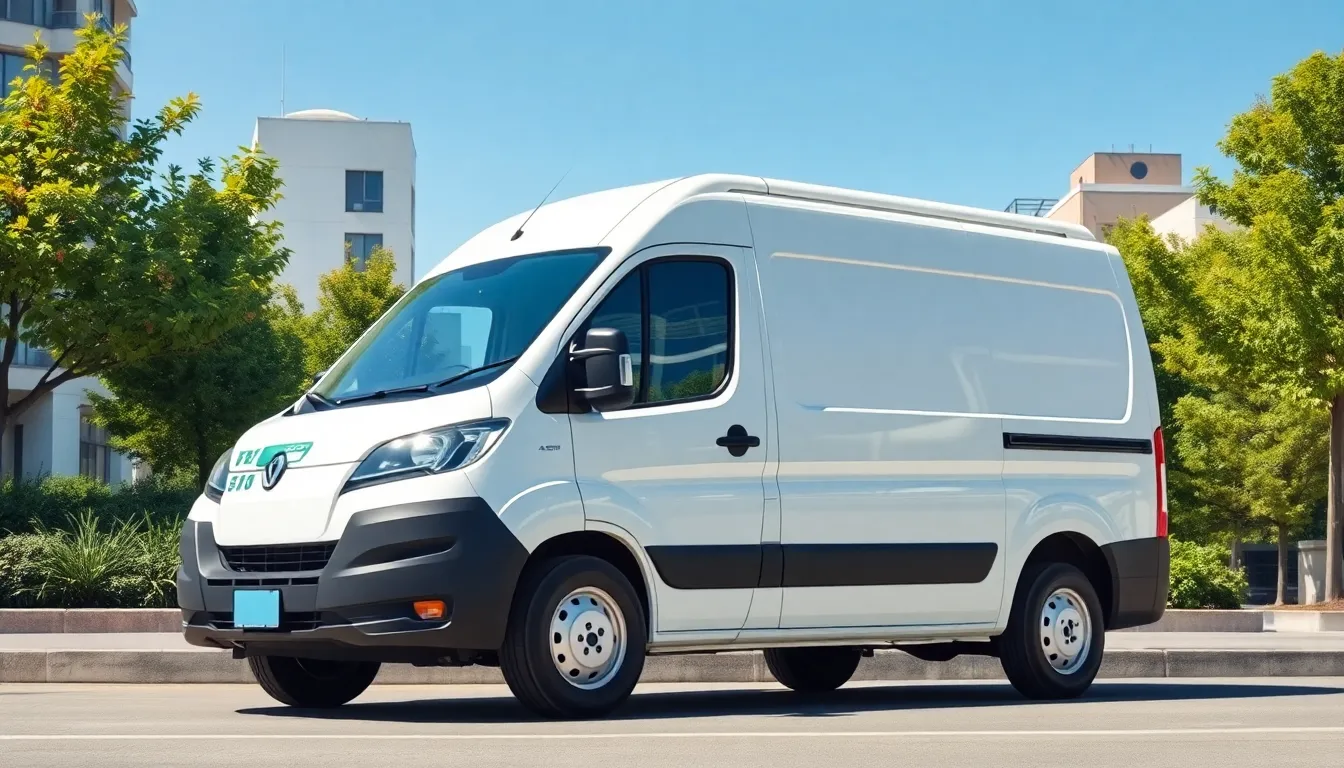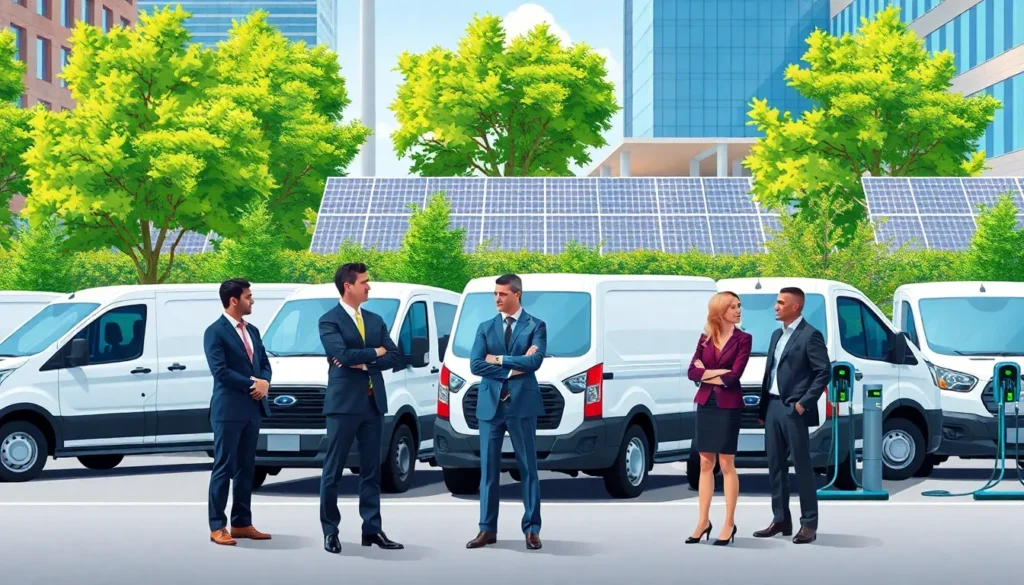In a world where gas prices are rising faster than a caffeinated squirrel, electric fleet solutions are zooming into the spotlight. Companies are discovering that swapping out traditional vehicles for electric ones isn’t just good for the planet; it’s a smart business move that can save a bundle. Who wouldn’t want to cut costs while impressing eco-conscious clients?
Table of Contents
ToggleOverview of Electric Fleet Solutions
Electric fleet solutions represent a significant shift in how businesses manage their transportation needs. This approach not only reduces carbon footprints but also enhances operational efficiency.
Definition and Importance
Electric fleet solutions involve transitioning traditional vehicles to electric models. This transformation plays a crucial role in decreasing greenhouse gas emissions. Companies adopting electric vehicles experience financial advantages through lower fuel and maintenance costs. Additionally, these solutions help businesses align with sustainability goals, attracting environmentally conscious customers and improving brand loyalty.
Key Components
Several key components drive the effectiveness of electric fleet solutions. Charging infrastructure stands at the forefront, ensuring vehicles remain operational throughout the day. Battery technology plays a critical role in determining range and performance, with advancements continuously enhancing efficiency. Fleet management software enables businesses to track vehicle usage, monitor energy consumption, and optimize routes. Maintenance protocols for electric vehicles differ from those of traditional vehicles, requiring specialized training for staff. Investing in these components ensures a smooth transition to an electric fleet.
Benefits of Electric Fleet Solutions

Electric fleet solutions offer numerous advantages for organizations transitioning from traditional vehicles. Cost savings and environmental impact stand out as major benefits.
Cost Savings
Lower fuel costs represent a significant financial advantage for electric vehicles. Companies can save up to 70% on fuel expenses compared to gasoline-powered vehicles. Reduced maintenance needs also contribute to savings, as electric vehicles have fewer moving parts, leading to lower repair costs. Many government incentives further enhance affordability, making it easier for businesses to invest in electric fleets. Long-term savings extend beyond fuel and maintenance, solidifying electric vehicles as a financially sound choice for fleet managers.
Environmental Impact
Reducing greenhouse gas emissions is a key benefit of electric fleet solutions. Shifting to electric vehicles can cut emissions by up to 70%, significantly improving air quality. Owners of electric fleets contribute to environmental sustainability efforts while bettering their community. Additionally, electric vehicles reduce noise pollution, creating quieter urban areas. By adopting these solutions, organizations align with global sustainability goals, enhancing their brand image and attracting eco-conscious clients.
Challenges of Implementing Electric Fleet Solutions
Implementing electric fleet solutions presents specific challenges that companies must navigate for a successful transition.
Infrastructure and Charging
Infrastructure development poses a significant hurdle for businesses. Many organizations face limited access to adequate charging stations. Establishing a reliable charging network requires substantial planning and investment. On-site charging facilities offer convenience but demand space and resources. Additionally, slow charging capabilities can disrupt fleet operations during peak hours. A lack of standardization in charging connectors further complicates the integration of various vehicle models. Companies must assess electricity supply needs to avoid overloading existing systems. Addressing these infrastructure and charging challenges is essential for optimizing fleet performance.
Initial Investment
Initial investments in electric vehicles can be considerable. Purchases of electric vans and trucks often exceed those of conventional vehicles. Though fuel savings offset these costs over time, businesses may struggle with upfront expenditures. Fleet managers must also factor in expenses related to charging installations and maintenance. Governments sometimes provide financial incentives to ease these costs, enhancing the appeal of electric fleets. Organizations can benefit from promoting long-term cost savings, which often outweigh initial investments. Balancing these financial considerations is crucial for adopting electric fleet solutions effectively.
Real-World Examples and Case Studies
Numerous companies successfully adopted electric fleet solutions, showcasing the potential benefits and effectiveness of this shift.
Successful Implementations
FedEx implemented electric vehicles to reduce its carbon footprint. The company integrated a fleet of over 1,000 electric delivery trucks, aiming for a substantial reduction in emissions. UPS transitioned 10,000 vehicles to electric models, leading to impressive energy savings and operational efficiency. Amazon rolled out an electric delivery fleet, including 100,000 electric vans, targeting zero emissions by 2040. These examples illustrate how large corporations embrace sustainability through good decision-making.
Lessons Learned
Transitioning to electric fleets isn’t without challenges. Companies like DHL encountered infrastructure deficits, highlighting the need for accessible charging stations. Proper planning is essential for addressing these gaps. Financial obstacles can arise during initial investments. For instance, some firms underestimated the transition costs, which can exceed conventional vehicle purchases. Companies with comprehensive training plans for staff reported better efficiency in maintaining electric fleets. Lessons learned demonstrate the importance of proactive strategies in overcoming hurdles to achieve successful electric fleet integration.
Future Trends in Electric Fleet Solutions
The landscape of electric fleet solutions is rapidly evolving, driven by innovations and regulatory shifts. Companies pursuing sustainability will likely see significant changes ahead.
Innovations on the Horizon
Technological advancements continue to reshape electric fleets. Battery technology is one of the most significant areas of innovation, with solid-state batteries offering longer ranges and quicker charging times. Autonomous driving features enhance operational efficiency, enabling fleets to optimize routes and reduce costs. Additionally, software advancements in fleet management allow real-time tracking and predictive maintenance, improving overall performance. These innovations not only enhance productivity but also make electric vehicles more appealing to fleet managers.
Regulatory Changes
Regulatory frameworks are evolving to support electric fleet adoption. Many governments are implementing incentives and subsidies to encourage businesses to transition to electric vehicles. Emission reduction targets are becoming more stringent, forcing companies to rethink their transportation strategies. Some regions impose penalties for high-emission vehicles, further prompting the shift to electric options. Compliance with these regulations can enhance a company’s reputation, making adherence to emerging policies a strategic priority for fleet managers.
Embracing electric fleet solutions represents a pivotal shift in the transportation landscape. Companies are not only addressing environmental concerns but also reaping financial rewards through significant fuel and maintenance savings. As innovations in technology and infrastructure continue to evolve, the benefits of electric fleets will only grow.
Organizations that proactively invest in charging infrastructure and fleet management software will position themselves as leaders in sustainability. The journey towards electrification may present challenges, but the long-term advantages far outweigh the initial hurdles. By adopting these solutions, businesses enhance their brand image and attract a more eco-conscious clientele, ensuring they remain competitive in an increasingly green marketplace.





